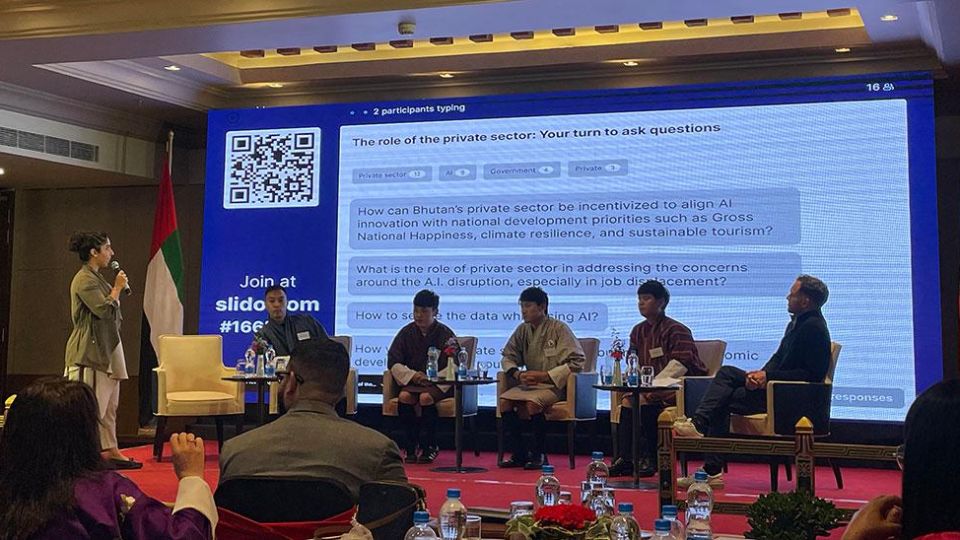July 18, 2025
THIMPHU – A two-day workshop on Artificial Intelligence (AI) for Development concluded yesterday with private sector heads highlighting the crucial role private sector partnerships play in fostering innovation and driving technological advancement in Bhutan.
The workshop highlighted how Bhutan’s unique approach to AI development in ethical considerations, cultural authenticity, and public-private partnerships could serve as a model for other developing nations seeking to harness artificial intelligence for sustainable development.
The Analyst at the Innovation and Technology Department of Druk Holding and Investments Limited (DHI), Zigmyal G. Wangchuk outlined DHI’s efforts to build comprehensive incubation systems spanning private and public sectors as well as academic institutions.
“Bhutan could focus on what Singapore has done with their AI environment ecosystem,” Zigmyal said, referencing Singapore’s AI strategy that emphasises healthcare applications, talent development pipelines, and ethical AI governance. “That is where DHI comes in, working with partners from abroad, private sectors and local experts to come up with policies and regulations that enable AI development.”
DHI has implemented an impact matrix system to prioritise projects, focusing on initiatives that offer “low effort, high impact” while identifying opportunities with the highest benefit for the society.
DHI has partnered with GovTech, Thimphu TechPark Limited (TTPL), and the AI’s training platform called Omdena, and AI-Lab is also being launched, which has trained over 200 AI and data scientists in its first year of operation, he added.
The company is also developing a cloud computing project at its DHI Research & Innovation Venture Excellence (DRIVE) center, repurposing old GPUs to create a platform where DHI companies and academic institutions can test, train, and develop AI models.
Local AI startups are finding significant opportunities in government partnerships, according to several entrepreneurs who participated in the discussion.
The CEO of Jaggle.AI, Jigme Tashi Namgyal said he launched his company to address inefficiencies in technical industries after experiencing management challenges while working as a technical lead in Japan. His startup now develops solutions for government agencies, demonstrating how private sector agility can complement public sector stability.
“As a private sector, it’s all about agility,” Tashi explained. “With agility, a lot of innovation can be brought up. There’s things that public sectors and government agencies cannot do that private sectors can contribute to.”
Ugyen Dendup, CEO of NoMind Bhutan, talked about the efficient improvements from his company’s AI chatbot implementations. At the Bank of Bhutan (BOB), the chatbot reduced customer service center workload by 78 percent and deflected incoming calls by 17 percent on its launch day.
“We are basically changing our mindset from manual process to AI automation,” Ugyen said. His company now processes around 12,000 messages daily and is expanding beyond basic chatbots to comprehensive AI agents that handle complex tasks like booking airline tickets through conversational interfaces.
Many of the speakers emphasised the importance of leveraging Bhutan’s cultural context while building for international markets.
The founder of Guu.ai, Ngawang Gyeltshen talked about his company that focuses on authentic Buddhist mindfulness teachings to differentiate from what he sees as misinterpretations in the global market.
“Startups from Bhutan, especially in the AI landscape, I think it’s very important for us to look at the global market as our eventual destination,” Ngawang said. “But having the government be the first client, or corporate entities as the first client, can be a good launchpad for us to sort of reach the global market.”
The Senior Vice President of Corporate Marketing and Communications at G42, Giacomo Ziani, highlighted that cultural context should be viewed as an opportunity rather than a barrier for AI development.
“Cultural context should never be a barrier, but is actually an opportunity to design better solutions, better products, more authentic solutions,” Giacomo said. “In the case of Bhutan, aligning to the local culture and to the principles of Gross National Happiness is fundamental for these AI solutions and startups to be successful.”
G42 runs startup accelerators globally, selecting companies based on three key criteria, said Giacomo. Including product-market fit, team strength, and scalability potential. The company supports selected startups through financial backing, ecosystem integration, and technology resources including cloud computing access.
Despite the optimistic outlook, speakers shared infrastructure needs as scaling challenges. Ugyen said that domestic cloud services and clearer data privacy regulations would help local companies expand both nationally and internationally.


